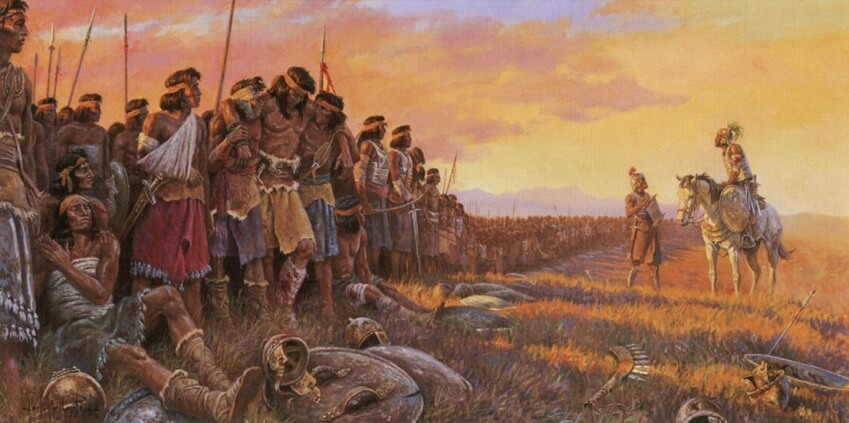As the wickedness of the Nephites was reaching a point of no return, Mormon—typifying the role of a proxy savior—said to Moroni, “Behold, my son, I cannot recommend them unto God lest he should smite me. But behold, my son, I recommend thee unto God, and I trust in Christ that thou wilt be saved; and I pray unto God that he will spare thy life” (Moroni 9:21–22).
Even when the entire Nephite nation was mown down by the Lamanites in the great battle at Cumorrah and its aftermath, we see Moroni’s life being spared. However, it was not simply Mormon’s heartfelt prayer that caused God to spare Moroni’s life. And it certainly was not that Moroni ran away and hid. Rather, it was Mormon’s righteousness to which God had respect.
As in the Davidic Covenant, in which a proxy savior keeps God’s law and those to whom he ministers keep his law, so God was under obligation to spare Moroni’s life according to the terms of his covenant. The same was true of the sons of Mosiah, who, like Ammon, “could not be slain” (Alma 18:3; 19:23). At issue there was Mosiah’s righteousness and his sons’ loyalty.
The same covenantal arrangement served Helaman and his two thousand Lamanite warriors as we have explained previously. They too could not be slain on account of the righteousness of Helaman, who kept God’s law, and of his “sons” who kept Helaman’s law. This, their mothers knew who had been taught by the sons of Mosiah, and had also witnessed of themselves.
As Joseph in Egypt served as a “father”—a proxy savior—to Pharaoh (Genesis 45:8), and as King Hezekiah served as a “father” to his people, whom he called his “sons” (2 Chronicles 29:11), so will the kings and queens of the Ephraimite Gentiles be “fathers” and “mothers” to the house of Israel (Isaiah 49:22–23; 1 Nephi 21:22–23; 2 Nephi 6:7; 10:9, 18; 3 Nephi 20:45; 21:8).
Isn’t the measure of a “man”—that which distinguishes him from something less than a man—his role of “intercessor” on behalf of those to whom he has stewardship (Isaiah 59:16)? The Davidic Covenant, of which temple covenants are an embodiment, provides the vehicle for growing into all we can become. Here, too, at issue is our purity and righteousness before God.
Such righteousness, however, is grounded in, and exemplified by, proxy saviors being “doers of the word, and not hearers only, deceiving your own selves” (James 1:22). Indeed, it takes being “valiant in the testimony of Jesus” and seeking to “bring souls to Jesus” that characterizes end-time saviors of men (Isaiah 49:22–23; 3 Nephi 28:29; Doctrine & Covenants 7:4; 76:79).



